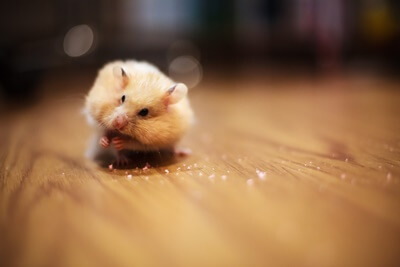Last Updated on: 24th September 2023, 05:48 pm
When hamsters wake up, they make a lot of noise, often keeping their owners awake or waking them up.
Reduce hamster noise levels with a silent exercise wheel and get a barless cage. Ensure it has toys and enrichment, such as cork logs, a sand bath, and things to chew on, as this will reduce noisy rodent behaviors. Playing with the hamster before bedtime will burn off some energy.
However, you mustn’t remove a hamster’s exercise wheel, as doing so will have a detrimental effect on its health and well-being, causing it to become destructive and even noisier.
How To Get Your Hamster To Be Quiet at Night
Before trying to keep a noisy hamster quiet, be aware that hamsters sleep at different hours than us.
Although hamsters are considered nocturnal, they’re crepuscular (active between dusk and dawn). Your hamster will wake up around the same time you go to bed.
You can take steps to reduce the noise at night by making the following adjustments:
Silent Exercise Wheel
Hamsters make noise when they run on their exercise wheels at night. However, this is usually due to the quality of the wheel, not the hamster.
Some wheels rattle around and squeak as the hamster runs, especially when old and rusty. Lubricating these parts with olive oil, butter, Vaseline, or groundnut oil can help minimize the noise.
There are also silent exercise wheels designed to make less noise, enabling you to get some sleep. The best quiet hamster wheels include:
- Silent Runner.
- Niteangel Super-Silent Wheel.
- Silent Spinner.
- Zacro Hamster Wheel.
- Getzoo Wooden Hamster Wheel.
- Trixie Exercise Wheel.
You can find silent wheels made from wood or plastic, which minimize noise. Laboratory Animals explains how hamsters prefer wheels 35 cm in diameter or more, so choose a large wheel.

Plastic or Glass Cage
Many hamsters chew their cage bars at night, either through stress or because they’re attempting to gnaw their teeth down. While the former is more common, both instances cause significant noise, which is a problem caused by barred cages.
Plastic and glass cages minimize noise because there are no bars for hamsters to chew. Hamsters will look for other things to chew, such as toys and food.
For example, providing shelled nuts is a good way to keep hamsters entertained, fixing their noses to the ground instead of trying to find ways to escape or release stress through stereotypies.
Enrichment
Wild hamsters forage for food, escape predators and dig large tunnel networks. These activities keep them busy, but they’re difficult to replicate in captivity.
That’s why ensuring your hamster’s cage is filled with enrichment keeps its behavior under control, making it less likely to create too much noise. Good forms of enrichment include:
- Sand bath.
- Digging box filled with coco fiber or flower forage.
- Grapevine.
- Cork logs.
- Chew toys, such as applewood sticks, loofahs, or Whimzees.
- Sprays like millet and flax.
- Scatter-fed seeds and pellets.
Replicating wild conditions is the best way to ensure your hamster’s happy, stress-free life, making it feel more settled in its cage at night.
Turn the Lights Off Earlier
Turning the lights off earlier can encourage a hamster to come out sooner. By the time you go to bed, the hamster may have had enough time to finish its activities, giving you a better chance of sleep.
While all hamsters are slightly different, they don’t tend to stay up for hours. They enjoy short periods of activity before taking a nap, continuing this cycle throughout their waking hours.
If you can go to bed before a hamster restarts its adventures, you can sleep without waking up.
Play Before Bed
Most hamsters enjoy out-of-cage time each night, where they can stretch their legs and roam.
You can help the hamster burn energy before you sleep by playing with it outside its enclosure for 30-60 minutes. Doing so will help your hamster settle down.
However, only do this if your hamster is already up. Waking it prematurely will have the opposite effect, making your hamster feel stressed and angry.

Should You Cover a Hamster Cage at Night?
You may think that covering a hamster’s cage at night will reduce the noise level.
However, it won’t encourage a hamster to be quiet. Hamsters sleep when the sun rises, so the darkness produced by a cover will do nothing to calm a hamster down.
You’re likely to make your hamster even noisier by tricking it into thinking it’s nighttime for longer.
Not only that, but covering your hamster’s cage with a blanket or something similar will restrict the airflow through the cage. If you live in a hot, humid environment, your hamster could overheat and dehydrate.
If the hamster can reach the cover, it’ll chew it, using the fragments as nesting material. However, there’s also a chance of ingestion or choking. Unfortunately, you won’t be around to intervene.
Can I Move My Hamster Cage at Night?
There may be times when you find your hamster too noisy at night, particularly if you need to get a good night’s sleep. That’s why you might consider moving the cage elsewhere for a short time.
If you place the cage in a warm, quiet position free from draughts and dangers, the hamster shouldn’t have a problem with a temporary move.
Don’t move your hamster to another cage, though. Hamsters like to mark their territory and smell their unique pheromones in the bedding.
They also don’t cope well with being in a smaller cage than they’re used to. Lab Animals found that hamsters kept in small cages develop chronic stress.
Similarly, cage moves cause stress, so you shouldn’t change a hamster’s location too often.
If you’re moving your hamster’s cage every night to get some sleep, you should consider positioning the enclosure to a new permanent spot to minimize stress.
Can I Take My Hamster’s Wheel Out at Night?
Hamsters need physical and mental enrichment while they’re awake. An exercise wheel is essential because they like to travel long distances. Hamsters can run up to six miles a night, which is vital to:
- Burn energy.
- Help control weight.
- Minimize boredom.
- Prevent stress-related stereotypies.
While large cages are ideal, they don’t allow hamsters to reach maximum exercise potential. Removing the exercise wheel to reduce the noise will negatively affect a hamster’s physical and mental well-being.
As mentioned, getting in a silent exercise wheel is better to minimize noise levels.
Hamsters will never be silent animals. If you keep your hamster in a bedroom, allow for noise. Providing an enriching environment is essential in preventing noisy stress-related behaviors.





